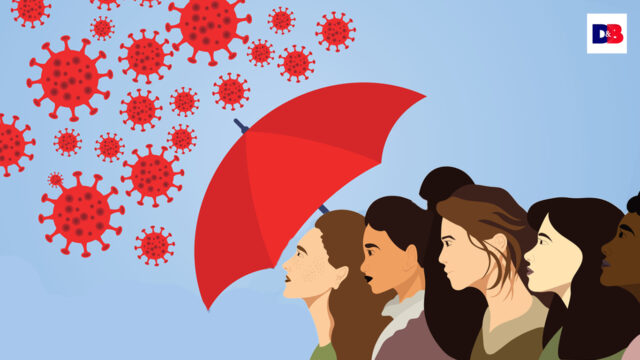COVID 19 changed the ‘normal’ world and brought with it unforeseen problems. On one hand, the economies all over the world struggled for survival. On the other, the understanding of domestic life went through a major change for many. The impact of the pandemic has been extreme in terms of intensity and the number. The United Nations inferred that women were the most impacted strata during the period of lockdowns and restrictions. Their contribution ranged from being front-line responders due to their involvement in hospitals as care givers or staff; to their role in the support bubble that they provide by being helpers in different fields.
The Indian society is no different where in addition to the demands of the professional role, women faced challenges on multiple fronts at home. As a norm, there are ‘softer’ fields like hospitals, store salespersons, support bubble and so on where women continue to dominate in presence. Strangely enough, there are gender stereotypes that exist in the society that categorise jobs. Despite the belief about men being physically stronger, it is interesting to note that daily labourers, farmers, cleaners have a huge number of women workers. Yet, there is a distinction between men and women in terms of the overall responsibility taking into account the house work and the bread earning tasks. The economic disparity is huge too. The gap between men and women in terms of responsibility got even wider during the COVID 19 when women faced situations in which they catered to physical as well as mental needs of many while being confined inside homes.
In a society characterised by an unequal gender driven division of labour (men and women have different responsibilities), the lopsided curve increased the physical as well as mental stress on women. Leaving aside a small population of upper middle class onwards society, the women in villages as well as cities bore the brunt of daily chores, additional responsibilities, as well as faced domestic violence and sexual abuse. The hardships of unemployment were written about but the frustrations were taken out often on women and children. The endurance power of women was tested more since there was no escape in the name of work due to the series of lockdowns and restrictions. The working mums automatically got an additional responsibility of baby sitting and care giving. The lack of basic freedoms like – leisure time, phone calls, access to internet are all realities for women who were home bound with family especially in rural areas. The unwanted pregnancies and difficulty in access to abortion services led to real struggles for a lot of women. The number of domestic violence cases was the highest in a decade during the COVID 19 lockdowns and this data excluded the unreported ones. The National Commission for Women reported a rise in the number of complaints from 116 in the first week of March 2020 to 257 in the final week of the month.
The pandemic has taught us the importance of family, co-existence and basic necessities. It is now time to ensure that women get their due place. Physical labour of women is under estimated. A study revealed that 22.5 % married women worked for more than 70 hours per week and the unemployed ones cross those statistics because their work is ‘unpaid labour’. The physical strain and the mental stress of women need to be acknowledged and reduced.
While the state of affairs is heartbreaking, there are certain steps that can be taken to ensure that there is at least a helpline to call for women at all times in case there was a cry for assistance. There should be special distribution centers in rural areas that have medical facilities as well as counseling sessions for women. A major problem faced during the lockdowns was that the abusers were residing in the same house all the time. In order to deal with these unexpected scenarios, there is a need for a 24 hours helpline to work with special respite homes to offer for women who report domestic violence. The key is what the World Health Organisation suggested – offer first line support, provide medical assistance and connect / support survivors. Alongwith this, there is an urgent need to educate people about the norm of “shared responsibility” to inculcate a culture in future generations. Gender based division of labour is unjust to say the least. It is time we rectify that and normalise the help culture towards women as well.









